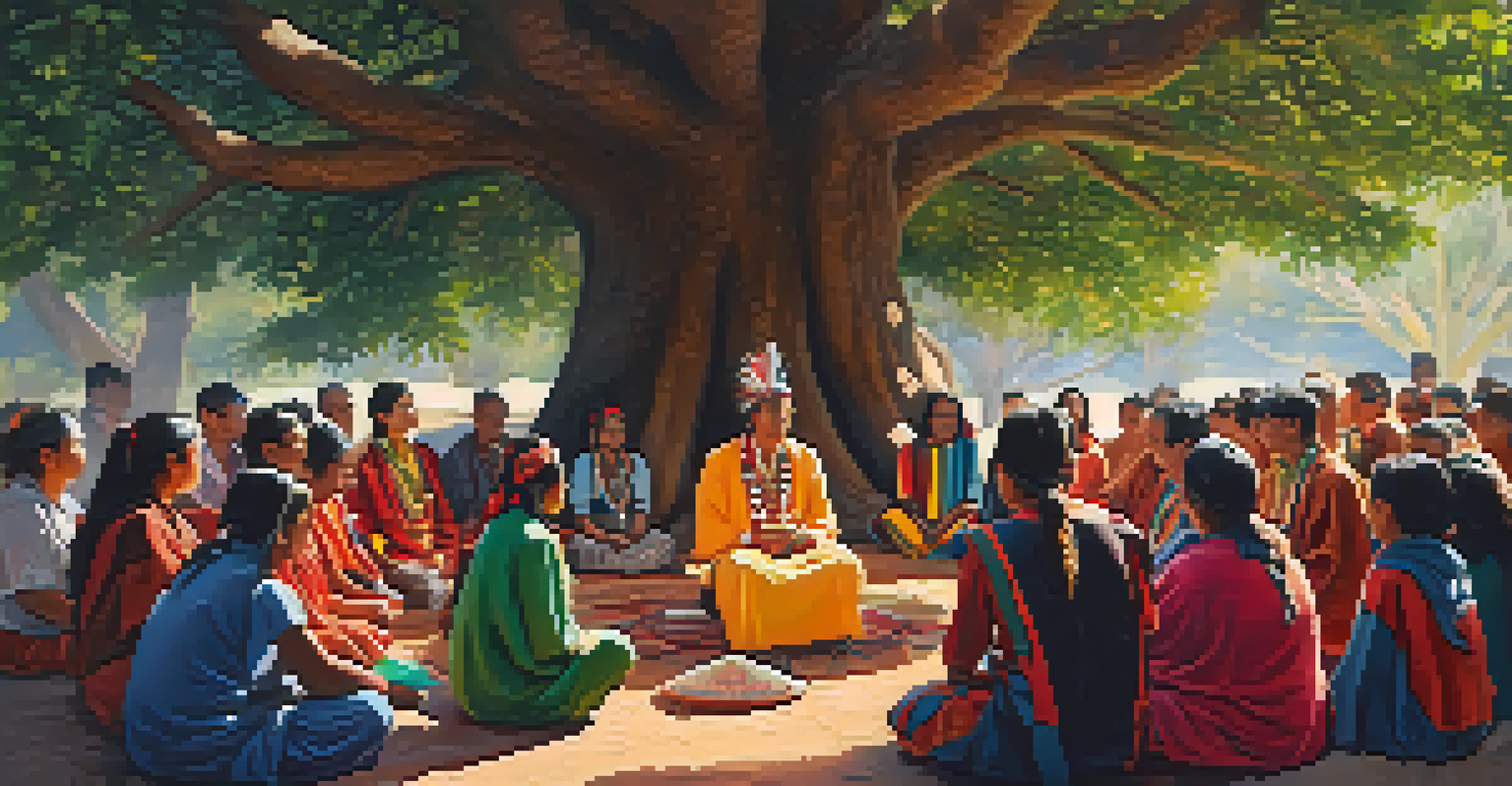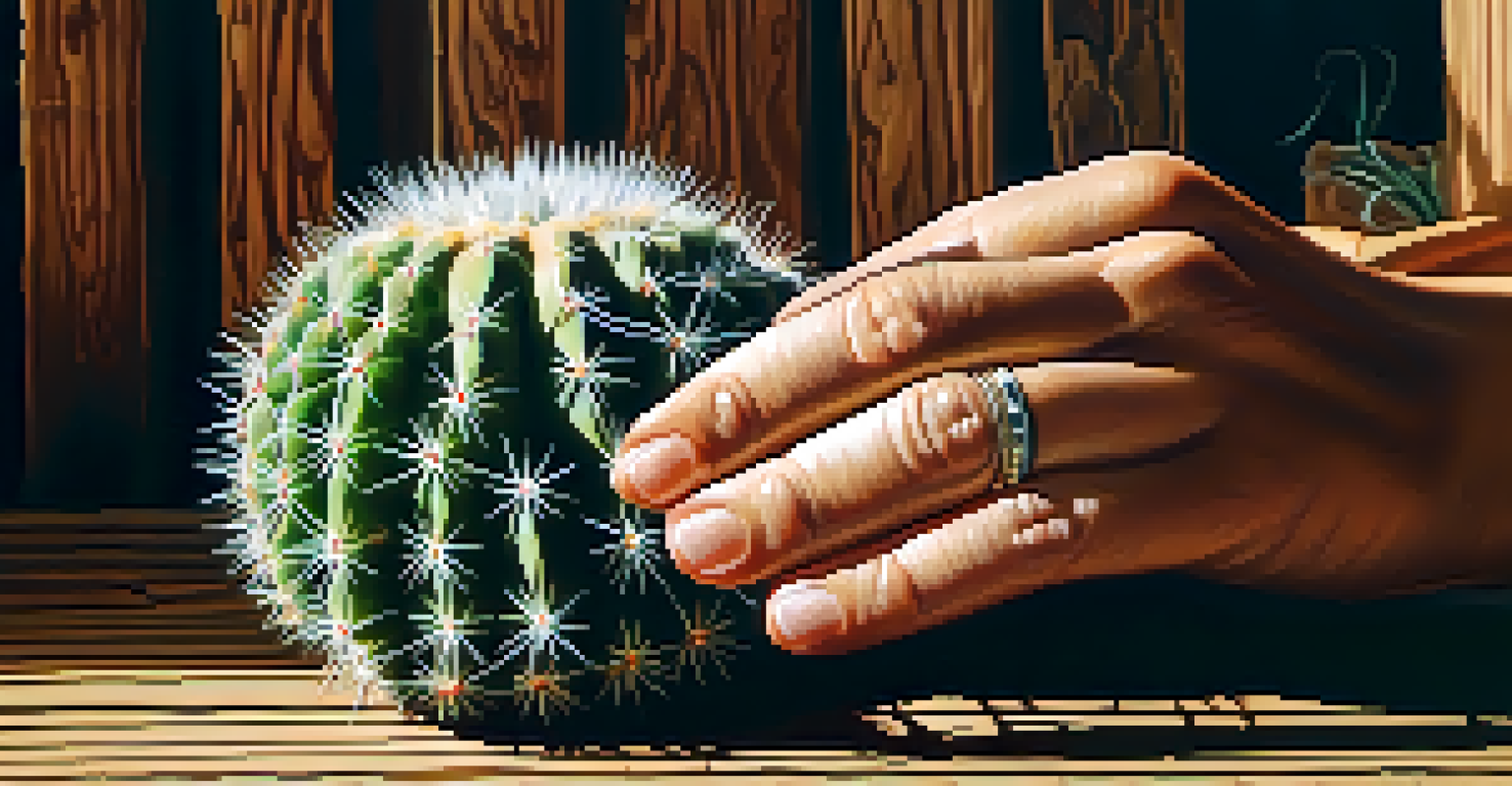The Intersection of Peyote, Culture, and Mental Health

Understanding Peyote: A Cultural and Historical Overview
Peyote, a small cactus native to Mexico and the southwestern United States, has been used for thousands of years in various cultural and spiritual contexts. For Indigenous peoples, it serves as a sacred tool for religious ceremonies, symbolizing a connection to the divine. The history of peyote is rich, intertwining with the spiritual practices and traditions of many tribes, particularly the Huichol and Navajo nations.
Psychedelics can facilitate profound emotional healing and insights, helping individuals cope with conditions like depression, anxiety, and PTSD.
The use of peyote is often linked to rituals aimed at healing, guidance, and introspection. These ceremonies not only facilitate a deeper understanding of oneself but also strengthen the communal bonds among participants. As these practices have been passed down through generations, they have become integral to the identity of these cultures.
In recent years, there has been a resurgence of interest in peyote, not only for its cultural significance but also for its potential therapeutic benefits. Understanding its cultural roots is essential for appreciating the broader implications of its use in mental health and wellness.
The Role of Peyote in Indigenous Spiritual Practices
In many Indigenous cultures, peyote is revered as a sacrament, playing a pivotal role in spiritual ceremonies. These rituals often involve communal gatherings where participants consume peyote to seek vision and guidance. The collective experience fosters a sense of unity, allowing individuals to connect with one another and their cultural heritage.

The peyote experience is often described as a journey into the self, where participants may confront personal challenges or gain insights that facilitate healing. This process can be both profound and transformative, helping individuals navigate life’s complexities with renewed clarity. For many, such experiences reaffirm their cultural identity and connection to the land.
Peyote's Cultural Significance
Peyote has been a sacred tool for Indigenous peoples, symbolizing a deep connection to spirituality and community.
However, it's important to note that the use of peyote in spiritual contexts should be approached with respect and understanding. Misappropriation of these practices can lead to a disconnect from their true significance, emphasizing the need for cultural sensitivity in discussions around peyote.
Psychedelics and Mental Health: A Growing Interest
Recent research has rekindled interest in psychedelics, including peyote, for their potential mental health benefits. Studies suggest that psychedelics can facilitate profound emotional healing and insights, helping individuals cope with conditions like depression, anxiety, and PTSD. This has led to a broader conversation about how traditional practices can inform modern therapeutic approaches.
The use of peyote in spiritual contexts should be approached with respect and understanding.
Psychedelics work by altering perception and consciousness, which can lead to significant shifts in mental states. For example, many users report experiencing enhanced emotional processing during their journeys, often resulting in breakthroughs regarding long-standing issues. This phenomenon has captured the attention of scientists and mental health professionals alike, who are exploring how such experiences can be integrated into therapeutic settings.
However, the use of psychedelics, including peyote, should not be taken lightly. It's essential to approach this area with caution, respect, and a thorough understanding of both the potential benefits and risks involved.
The Science Behind Peyote's Effects on Mental Health
Psychedelic compounds in peyote, primarily mescaline, interact with the brain's serotonin receptors, leading to altered states of consciousness. This interaction can enhance emotional and sensory experiences, allowing users to perceive the world in a new light. Such shifts can foster introspection, which is crucial for emotional healing and personal growth.
Studies have shown that psychedelics can stimulate neuroplasticity, promoting the brain's ability to adapt and form new connections. This characteristic is particularly promising for those suffering from mental health disorders, as it suggests potential pathways for healing. By fostering new ways of thinking and processing emotions, peyote may help individuals break free from negative thought patterns.
Therapeutic Potential of Peyote
Recent studies suggest that peyote may offer mental health benefits, aiding in the treatment of conditions like depression and PTSD.
Nonetheless, more research is needed to fully understand the long-term effects of peyote on mental health. While initial findings are encouraging, it's crucial to approach these insights with a balanced perspective, recognizing that individual experiences can vary widely.
Ethical Considerations in Peyote Use
As interest in peyote grows, so do the ethical considerations surrounding its use. For Indigenous communities, the harvesting and consumption of peyote are deeply tied to cultural practices and spiritual beliefs. The appropriation of these traditions by outsiders can lead to misunderstandings and exploitation, raising questions about respect and ownership.
It's vital to ensure that Indigenous voices are prioritized in discussions about peyote, especially as it gains popularity in the wellness community. Engaging with these communities respectfully and acknowledging their rights to their cultural practices is essential in fostering a more inclusive dialogue. This also involves recognizing the historical injustices faced by these populations and the ongoing impacts of colonialism.
Moreover, as the therapeutic potential of peyote is explored, establishing ethical guidelines for its use in clinical settings becomes increasingly important. These guidelines should respect cultural traditions while ensuring the safety and well-being of all participants.
Personal Stories: Transformative Experiences with Peyote
Many individuals who have participated in peyote ceremonies describe their experiences as life-changing. One common theme among these stories is the profound sense of connection to nature and the universe. Participants often report feeling a heightened awareness of their surroundings and an increased appreciation for life, which can lead to lasting positive changes in their perspectives.
Additionally, personal anecdotes often highlight the therapeutic nature of these experiences. Many people find that facing their fears or traumas during a peyote journey allows them to process emotions they had previously suppressed. This cathartic release can be incredibly healing, offering a sense of closure and understanding.
Ethical Use and Cultural Respect
The growing interest in peyote highlights the importance of ethical considerations and the need to respect Indigenous cultural practices.
Sharing these stories can help demystify peyote and its potential benefits, inviting more people to consider its role in mental health. However, it is essential to approach these narratives with care and respect, recognizing that each individual's journey is unique and deeply personal.
Future Directions: Peyote in Modern Therapeutics
As the landscape of mental health treatment evolves, peyote's role in modern therapeutics is becoming increasingly relevant. Researchers are beginning to explore how traditional Indigenous practices can inform contemporary approaches to mental health care. This intersection of old and new offers exciting possibilities for developing holistic treatment options.
Integrating peyote into therapeutic settings requires careful consideration and collaboration with Indigenous communities. By working together, we can create frameworks that honor cultural traditions while maximizing the potential benefits of peyote for mental health. This partnership can also serve to educate mental health professionals about the significance of these practices.

Ultimately, the future of peyote in mental health care lies in a respectful dialogue that values both scientific inquiry and cultural heritage. By bridging these worlds, we can foster a deeper understanding of peyote's potential and ensure that its use is both ethical and effective.